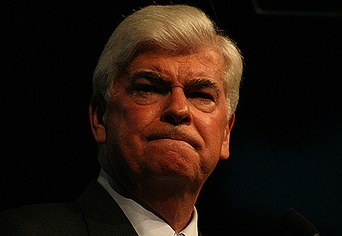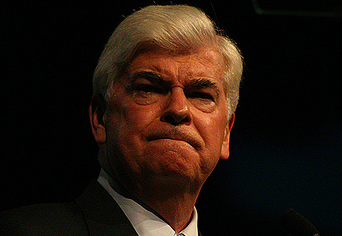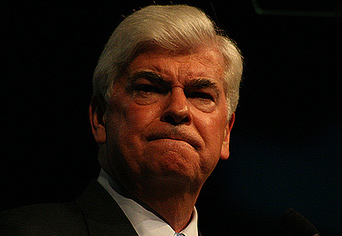
As congressional Democrats move financial reform to the top of their agenda, they’re bracing for bitter battles with industry and industry-friendly Republicans. But perhaps the biggest roadblock will come from one of their own: Christopher Dodd (D-Conn).
The powerful chairman of the Senate banking committee opposes a key reform that its proponents say would convert our sieve-like regulatory system into a genuine watchdog, by giving a single entity the power to regulate systemic risk. That sets Dodd on a collision course with President Barack Obama and House financial services committee chairman Barney Frank (D-Mass.), who both favor a financial “supercop.”
One cause of the economic crisis was that financial services firms could shop around for the softest regulator, escaping scrutiny for risky behavior. That’s because they’re monitored according to what kind of company they are, not what they actually do. Thrifts, investment banks, insurance companies, private equity firms, and hedge funds all deal in mortgages or mortgage derivatives. Yet these entities fall under regulatory regimes of varying strictness. The Office of Thrift Supervision oversees the thrifts. The Securities and Exchange Commission oversees investment banks; nationally chartered banks are regulated by the Office of the Comptroller of the Currency and are members of the Federal Reserve. Insurance companies are often monitored by state regulatory bodies. And hedge funds and private equity firms are barely regulated at all.
“Financial products and institutions should be regulated for the economic function they provide and the risks they present, not the legal form they take,” Treasury Secretary Timothy Geithner has said. “We can’t allow institutions to cherry-pick among competing regulators, and shift risk to where it faces the lowest standards and constraints.” The Obama administration has indicated that it wants one agency—most likely the Federal Reserve—to enforce tougher standards across the board.
That’s the part of the plan that Dodd, a longtime recipient of financial industry largesse, opposes. (Dodd’s office did not respond to a call for comment.) Instead, he wants a “council” of regulators (likely the Treasury, the Fed, the Federal Deposit Insurance Corporation, and the Securities and Exchange Commission). But this proposal is dead on arrival at the White House, which doesn’t want oversight done by committee. “The idea of having a council of regulators was pretty much vetoed,” one participant in an administration meeting with banking industry officials told the Associated Press on Friday.
In addition to the single systemic risk regulator, Obama has called for more stringent capital, liquidity, and transparency requirements, a tougher SEC, and a new commission that attempts to predict risks to the financial system. He also wants the Federal Reserve to wield regulatory clout over any entity that might need to borrow from it as a lender of last resort. Dodd’s backing for any or all of those initiatives would be crucial, and could require the White House or House negotiators to cave on the systemic risk regulator. Steve Adamske, a spokesman for Frank, says that while Frank definitely supports giving systemic regulatory power to the Fed, Dodd’s position is “not a dealbreaker” because there’s “no deal yet”—the legislation hasn’t been written. Dodd also has allies that might be able to change the administration’s mind: FDIC chair Sheila Bair and SEC chair Mary Schapiro prefer the “council of regulators” option.
Some experts caution that the debate over creating new regulatory entities is a distraction from the real failures that helped cause the financial crisis. “The reality is that we have a systematic risk regulator. It is called the Federal Reserve Board,” economist Dean Baker wrote in the Guardian last week. “They blew it completely. We will do far more to prevent the next crisis by holding our current risk regulator accountable for its failure (fire people) than by pretending that we somehow had a gap in our regulatory structure and creating another worthless bureaucracy.”
This debate will heat up soon, because financial regulation is the “next stop on the train” for House Democrats, says Adamske. Rep. Frank plans to hold hearings on potential regulatory regimes in May and June and may produce legislation in June, Adamske said. A spokesman for House speaker Nancy Pelosi confirmed the schedule.
Republicans could take advantage of the disagreement within Democratic ranks, but Adamske says he hopes financial reform will still win votes from across the aisle. “We did pass a credit card bill a few weeks ago that got 350 votes, and our predatory lending bill got 300 votes,” says. “We’ll get probably some, but we don’t know how many we’ll get.” But before Democrats start wooing Republicans, they might want to make sure they can convince Sen. Dodd.











